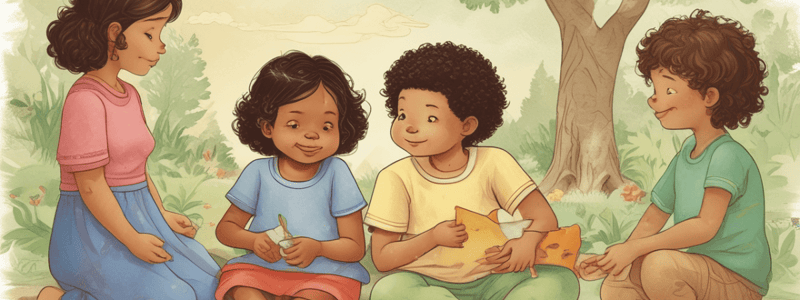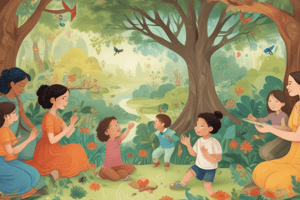Podcast
Questions and Answers
What is the primary concern when interacting with families from different backgrounds?
What is the primary concern when interacting with families from different backgrounds?
What do children often infer when they witness their families being criticized?
What do children often infer when they witness their families being criticized?
What is a key factor in building a strong relationship with a child?
What is a key factor in building a strong relationship with a child?
What is implied when a teacher welcomes and values a family?
What is implied when a teacher welcomes and values a family?
Signup and view all the answers
What is a critical aspect of supporting a child's development?
What is a critical aspect of supporting a child's development?
Signup and view all the answers
How do children perceive their family's relationship with the teacher?
How do children perceive their family's relationship with the teacher?
Signup and view all the answers
What is the consequence of a teacher being negative about a family's choices?
What is the consequence of a teacher being negative about a family's choices?
Signup and view all the answers
What is the primary goal of establishing a positive relationship with a family?
What is the primary goal of establishing a positive relationship with a family?
Signup and view all the answers
What is required to effectively support a child's development?
What is required to effectively support a child's development?
Signup and view all the answers
What is the consequence of a teacher's negative body language when interacting with a family?
What is the consequence of a teacher's negative body language when interacting with a family?
Signup and view all the answers
Study Notes
Preschool Teachers and Family Inclusion
- Preschool teachers play a significant role in helping young children understand and appreciate diverse family structures.
- Teachers should explain that the concept of family can mean different things to different people, emphasizing that families are created from love, care, and support, not just biological ties.
- To ensure inclusivity, teachers should use phrases like "your family" or "the people at home with you" instead of "mom" or "dad" to acknowledge various family types, such as single parents, stepparents, same-sex parents, grandparents, or other guardians.
Building a Welcoming Classroom
- Classrooms should have diverse materials and activities showcasing various family types to help children see their own family situation reflected in school materials and learn about others.
- Teachers should create opportunities for children to share stories or bring in family photos to discuss their families and traditions, promoting understanding and respect for everyone's unique family situation.
- These activities help build a classroom community where every student feels their family is recognized and respected, preparing children to be understanding and inclusive as they grow up.
Defining Family
- Family is defined differently by individuals, encompassing the people who live with them on a daily basis and those who contribute to their environment and social surroundings.
- A child's definition of family may include extended aunts, uncles, grandparents, or others who are important to them, highlighting the importance of understanding the child's perspective.
- Family can also include caregivers, neighbors, or teachers who take an active role in raising the child, emphasizing the significance of supportive relationships in a child's life.
Inclusive Practices for Teachers
- Teachers should recognize and respect each family's unique definition and structure, taking cues from families about who is important in their child's life.
- Inclusive practices involve creating a welcoming environment, using language that acknowledges diverse family structures, and celebrating different family types.
- Teachers should be mindful of their own biases and avoid making assumptions about families, instead focusing on building trusting relationships with children and their families.
The Importance of Partnership
- A strong partnership between teachers and families is crucial for supporting children's learning and development.
- Teachers should be respectful of families, acknowledging their perspectives and choices, even if they differ from their own.
- By doing so, teachers can create a positive and inclusive environment, fostering a sense of belonging and promoting children's social and emotional growth.
Studying That Suits You
Use AI to generate personalized quizzes and flashcards to suit your learning preferences.
Description
This quiz helps preschool teachers understand and explain different family structures to young children, emphasizing that families are built on love, care, and support. It promotes inclusivity and acceptance of diverse family setups.




